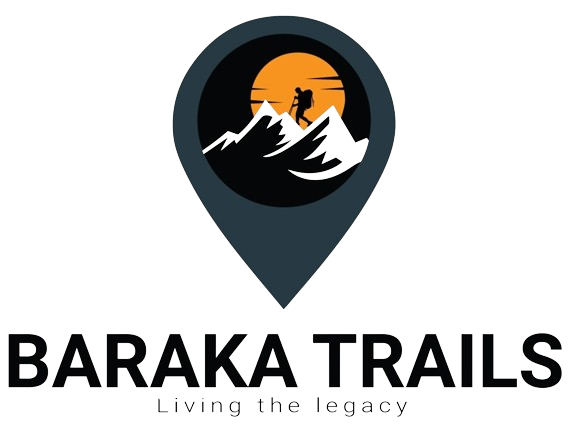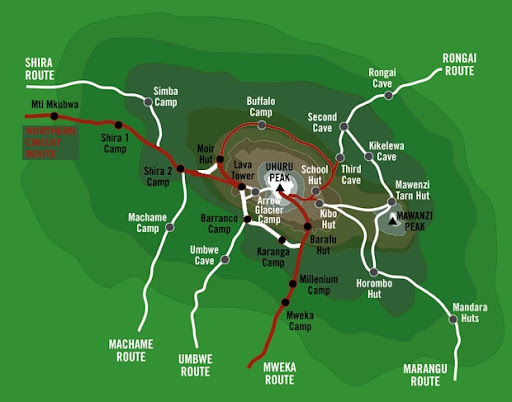9 Days Lemoshono sleep in crater



The 9-day Lemosho Route via Crater Camp is one of the most scenic and diverse routes to the summit of Mount Kilimanjaro. It offers excellent acclimatization opportunities and takes climbers through varied ecosystems, from lush rainforest to alpine desert, culminating in a unique overnight stay at Crater Camp, close to the summit.
DAY 1: LONDOROSSI GATE TO MTI MKUBWA CAMP
Transfer to Lemosho Park Gate for registration. Our porters prepare and pack our supplies and luggage before we start our ascent along the forest trail to Mti Mkubwa (Big Tree) campsite at 2895m. We will stay here overnight.
- Transport: 1.7 hours, 80 km
- Hiking time: 3 – 4 hours
- Ascent: 535 m
- Max. altitude: 2895 m
- Accomodation: Camping
- Meals included: Breakfast / Lunch / Dinner
DAY 2: MTI MKUBWA CAMP TO SHIRA 1 CAMP
Our journey continues eastwards across the Shira Plateau with spectacular views of Shira Cathedral. We cross moorland meadow to reach Shira 1 Camp for dinner and overnight camping at 3500m. By now we will be able to see the stunning glaciers of the Western Breach. It will be colder tonight than the previous night with temperatures possibly falling below freezing.
- Hiking time: 5 – 6 hours
- Ascent: 605 m
- altitude: 3500 m
- Accommodation: Camping
- Meals included: Breakfast / Lunch / Dinner
DAY 3: SHIRA 1 CAMP TO MOIR HUT
We leave the forest behind now and the trail gets steeper as it enters the moorland zone. A gentle grade walk takes you across the high altitude Shira Caldera to Moir Hut with fabulous views of Arrow glacier. We will camp here for the night at 4200m.
- Hiking time: 6 – 7 hours
- Ascent: 700 m
- Max. altitude: 4200 m
- Accomodation: Camping
- Meals included: Breakfast / Lunch / Dinner
DAY 4: MOIR HUT TO BARRANCO CAMP VIA LAVA TOWER
Today we will climb up to 4600m to the base of Lava Tower for lunch and acclimatization. This will be our toughest day so far and you may, for the first time, feel the altitude. After lunch we will descend again by almost 650m to Barranco Camp, following the “walk high, sleep low” golden rule of acclimatization. Our descent to Barranco Camp takes about 2 hours and offers great opportunities to take some beautiful photographs of the Western Breach and Breach Wall. The camp is situated in a valley below the Breach and Great Barranco Wall.
- Hiking time: 6 – 7 hours
- Ascent: 400 m
- Descent: 650 m
- Max. altitude: 4600 m
- Accomodation: Camping
- Meals included: Breakfast / Lunch / Dinner
DAY 5: BARRANCO CAMP TO KARANGA CAMP
A short but fun day, starting with a scramble to the top of the Great Barranco Wall. We then traverse over scree to the Karanga Valley (3930m) beneath the icefalls of the Heim, Kersten and Decken Glaciers. We will stay overnight at Karanga campsite.
- Hiking time: 4 hours
- Ascent: 260 m
- Descent: 280 m
- Max. altitude: 4210 m
- Accomodation: Camping
- Meals included: Breakfast / Lunch / Dinner
DAY 6: KARANGA CAMP TO BARAFU CAMP
We leave Karanga campsite behind to meet the junction connecting with the Mweka descent trail. From here we continue up to Barafu Camp. You have now completed the Southern Circuit, which offers views of the summit from many different angles. At camp, we can rest, enjoy dinner, and prepare for the summit day. The two peaks of Mawenzi and Kibo are to be clearly seen from this position.
- Hiking time: 3 – 4 hours
- Ascent: 670 m
- Max. altitude: 4600 m
- Accomodation: Camping
- Meals included: Breakfast / Lunch / Dinner
DAY 7: BARAFU CAMP TO SUMMIT TO CRATER CAMP
You will be woken around 07:00. We start our trek to the summit between the Rebman and Ratzel glaciers through heavy scree up to Stella Point on the crater rim. This is the most mentally and physically challenging part of the trek. At Stella Point (5732m), we will stop for a short rest. We are now only an hour away from the summit, Uhuru Peak (5895m), the highest point on Mount Kilimanjaro and the continent of Africa. After celebrating with a few summit photos, we begin our descent into Kibo Crater to camp for the night. The scenery is breathtakingly unbelievable and depending on the time of year, you will see the fast-receding glaciers set amidst either sandy, desert or snowy conditions.
- Hiking time: 9 – 10 hours
- Ascent: 1295 m
- Descent: 165 m
- Max. altitude: 5895 m
- Accomodation: Camping
- Meals included: Breakfast / Lunch / Dinner
Day 8: CRATER CAMP TO MWEKA CAMP
We wake up early to hike to the Crater Rim in time to see the sunrise. From the rim, we descend to Mweka Hut campsite. Trekking poles will be needed for the loose gravel going down to Mweka Camp (3100m). Later in the evening, we will enjoy our last dinner on the mountain and a well-earned sleep.
- Hiking time: 7 – 8 hours
- Descent: 2630 m
- Max. altitude: 5730 m
- Accomodation: Camping
- Meals included: Breakfast / Lunch / Dinner
DAY 9: MWEKA CAMP TO MWEKA GATE
Your final day on the trek, departing after breakfast we descend a further 1300m to the Mweka Park Gate to pick up your summit certificates from the Park Headquarters. Transfer to your hotel.
- Transport: 0.6 hour, 17 km
- Hiking time: 3 – 4 hours
- Descent: 1300 m
- Max. altitude: 3100 m
- Accomodation: Hotel
- Meals included: Breakfast / Lunch
Key Points
- Crater Camp is a unique feature of this itinerary, allowing climbers to sleep in the crater of the volcano.
- Acclimatization: The route’s structure allows for gradual acclimatization, increasing the chances of summit success.
- Scenery: The Lemosho Route is known for its beautiful and varied landscapes, from rainforest to moorland to alpine desert and arctic conditions at the summit.
Preparation Tips
- Physical Fitness: Ensure you are in good physical condition, as the climb is strenuous and involves long days of hiking.
- Gear: Pack appropriately for varying weather conditions, including warm clothing for high altitudes and wet-weather gear for the rainforest sections.
- Acclimatization: Pay attention to acclimatization recommendations, including taking it slow, staying hydrated, and listening to your body.
This route offers a memorable and challenging adventure to the top of Africa’s highest peak, providing an experience that is both physically demanding and incredibly rewarding.
Departure
After a much needed nights rest, we will bid you goodbye. If you have arranged airport transfers with us or a safari, Zanzibar trip or Chimpanzee trek in Mahale National Park, we will collect you in the morning for your onward journey.
PACKAGE INCLUDE
- Private pick up and drop off at Kilimanjaro international airport.
- Accommodations, 1 night before and 1 night after the trek. Sharing rooms (Hotel is Bed & Breakfast basis)
- Park fees, camping fees
- Rescue fees $20/climber
- 18% VAT on tour fees & services
- 4 Season big sleeping mountain tents (sharing for 2 people)
- Double layered Sleeping Mats
- Forest fee $10/person
- Transportation to & from the mountain gate
- Professional mountain guides, cooks and porters
- 3 meals daily while on the mountain
- Filtered water throughout the trek
- Fair wages for the mountain crew as approved by the Kilimanjaro National Park Authority (KINAPA), Kilimanjaro Association of Tour Operators (KIATO)
- Portable toilets and toilets tents (optional).
- Hot Water For Wash everyday at any time at the camp
NOT INCLUDED
- International and local Flights plus VISA
- Items of a personal nature (gears can be rented)
- Personal Tent $50 (Optional)
- Personal hotel room $90
What is Mount Kilimanjaro?
- Mount Kilimanjaro is the highest peak in Africa, located in Tanzania. It is a dormant volcano and one of the most iconic mountains in the world.
How tall is Mount Kilimanjaro?
- The summit of Mount Kilimanjaro, called Uhuru Peak, stands at an elevation of 5,895 meters (19,341 feet) above sea level.
How long does it take to climb Mount Kilimanjaro?
- The duration of a Kilimanjaro climb varies depending on the route chosen. Most climbs typically range from 5 to 9 days.
What are the different routes up Mount Kilimanjaro?
- There are several routes to the summit of Kilimanjaro, each with its own characteristics and scenery. Popular routes include the Marangu, Machame, Lemosho, Rongai, and Northern Circuit routes.
Is climbing Mount Kilimanjaro difficult?
- Climbing Kilimanjaro is challenging due to its high altitude, but it doesn’t require technical climbing skills. However, climbers should be physically fit and prepared for the rigors of high-altitude trekking.
Do I need a guide to climb Mount Kilimanjaro?
- Yes, it is mandatory to have a registered guide accompany you on your Kilimanjaro climb. Guides are essential for safety, navigation, and providing support throughout the trek.
When is the best time to climb Mount Kilimanjaro?
- The best times for climbing Kilimanjaro are during the dry seasons, which are typically from late June to October and from December to March. These months offer clearer skies and better trekking conditions.
What should I pack for climbing Mount Kilimanjaro?
- Essential items for climbing Kilimanjaro include proper clothing for varying temperatures, sturdy hiking boots, a good quality sleeping bag, trekking poles, personal medications, and other necessary gear as recommended by your tour operator.
What are the risks of climbing Mount Kilimanjaro?
- The main risks of climbing Kilimanjaro include altitude sickness, which can affect anyone regardless of fitness level, as well as other potential hazards such as extreme weather conditions and physical exhaustion.
Do I need to train before climbing Mount Kilimanjaro?
- Yes, it is highly recommended to undergo physical training and preparation before attempting to climb Kilimanjaro. This can include cardiovascular exercises, strength training, and hiking to build endurance and fitness levels.
Per Person $3,550
GROUP 3,350

